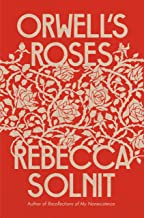Orwell’s Roses by Rebecca Solnit 2021
Solnit, a prolific essayist who writes about the environment, feminism, climate change, and other major issues on the progressive agenda, has written a fascinating and intriguing book about another extraordinary essayist, George Orwell.
The book evidently was stimulated by two independent events. First, Solnit and a friend became fascinated with trees, specifically the ancient redwoods in the John Muir woods near her home in San Francisco as well as a grove of eucalyptus trees planted in San Francisco by Mary Ellen Pleasant, a Black woman born into slavery around 1812 who had become a heroine of the underground railroad. Solnit viewed these trees as a ‘saeculum’ an Etruscan word describing the span of time of the oldest person present in a group. As she wrote, “They (the trees) changed the shape of time”. The other event was Solnit’s reading of an essay by Orwell written in 1946 about a yew tree planted years earlier in a Berkshire churchyard. Orwell wrote “the planting of a tree, especially one of the long-living hardwood trees, is a gift which you can make to posterity at almost no cost and with almost no trouble, and if the tree takes root it will far outlive the visible effects of any of your other actions, good or evil.” With that sentence, I was all in since we have planted a tree in Vermont for each of our grandchildren and over the years have planted perhaps as many as 50 trees on our property there.
Solnit takes this theme of planting trees, gardens, and roses and writes a non-traditional biography of George Orwell, born Eric Blair in 1903 who died in 1950 of tuberculosis. Orwell’s writing whether in his famous novels ‘Animal Farm’ and ‘1984’ or his many essays and non-fiction works is particularly timely for today’s world of autocracy, totalitarianism, and the proliferation of lies and untruths in the public market place—topics which Irwell wrote about over and over.
Solnit visits Orwell’s old cottage in the village of Wallington where he lived from 1936 until 1946, perhaps his most happy and productive years after being born in India, working as a colonial policeman in Burma, living down and out in Paris, and fighting with the Republican Loyalists in the Spanish Civil War. The visit to Wallington where she found several rose bushes which Orwell had planted (hence, the title of this book), leads her to follow a number of tangential leads from the abuses of the rose growing industry in Colombia to Jamaica Kincaid’s Vermont garden, from a painting by Joshua Reynolds of Orwell’s ancestors to a day spent in the Cambridge University Library exploring the papers of Charles Hurst who wrote about rose genetics, from Hannah Arendt to the Stalinist purge of the brilliant agronomist, Nikolai Vavilov. You probably are getting the idea that this book is a rich source of fascinating information as Solnit hurries down what she herself describes as various ‘rabbit holes’.
Most chapters begin with the sentence, “In the year 1936, an Englishman planted roses.” From this minimalist theme, Solnit has spun a remarkable book about Orwell, roses, the clash between facts and lies, the ability of democracies and the free press to survive, and the future of our world. I loved it.



